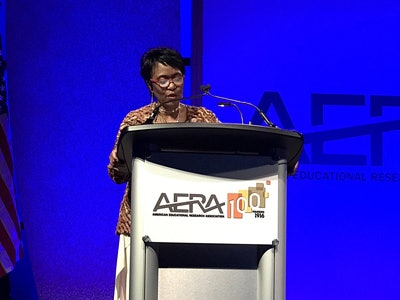SAN ANTONIO — It’s become the destination spot for education researchers, drawing in graduate students, newly minted Ph.D.s and a cast of well-known scholars who, despite their acclaim, spend six days deeply engaged in discussions about the direction of the field.
One attendee called the annual meeting of the American Educational Research Association (AERA) a family reunion where she doles out hugs and kisses to her colleagues that she only gets to see about once a year.
 Outgoing AERA president Dr. Vivian Gadsden, a professor at the University of Pennsylvania, delivers the presidential address at the organization’s annual meeting in San Antonio.
Outgoing AERA president Dr. Vivian Gadsden, a professor at the University of Pennsylvania, delivers the presidential address at the organization’s annual meeting in San Antonio.Now in its 98th year, the gathering of these scholars provide a unique opportunity for discussions centered on educational opportunity, access and equity, and the need for more interdisciplinary and cross-cutting research between education and other fields.
A litany of other panels focused on the need to connect educational, social and public policies to system challenges that result in problems such as incarceration, homelessness, and health and education disparities.
Unlike many other scholarly associations, AERA has put social justice at the forefront of its agenda. Even the theme of this year’s conference, “Knowledge to Action: Achieving the Promise of Equal Educational Opportunity,” is an effort to push researchers to offer solutions that can be acted upon by policymakers.
That kind of focus is aligned with the work of Renee L. Garraway, an assistant principal in Maryland who is also a doctoral student in educational leadership at Bowie State University.
“It has been an awesome opportunity just to be here,” said Garraway, whose research focuses on providing culturally responsive educational opportunities for students with special needs. “All of the presenters have been approachable and knowledgeable and several have even offered some mentoring.”
That is good news for Garraway, who has plans to transition to secure a tenure-track teaching position at a university once she completes and defends her dissertation.
Garraway attended a session on how to make the transition from graduate student to assistant professor. During that session, new tenure-track faculty gave tips on how to prepare for a shrinking job market.
“You’re looking for your place as they are looking for their next faculty member,” said Dr. Taucia Gonzalez, an assistant professor of education at the University of Wisconsin–Madison. “Finding the right fit is important.”
There were other panels as well, including those that focused on the need to improve the number of women in leadership positions across the academy and contemporary issues in second language research.
Drs. Stella Flores of New York University and Victor B. Sáenz of the University of Texas at Austin organized a panel titled “Texan, Born and Raised: Higher Education Tejano Scholars and Equity-minded Research Agendas.” The panel included an intergenerational group of scholars at varying levels of the professoriate.
The organizers argue that, despite the fact that the state is known for its political conservatism, on the education front Texas has had a long tradition of producing well-known scholars, many of whom have become recognized scholars on a range of equity-minded topics such as affirmative action.
Dr. Denisa Gandara, an assistant professor of higher education at Southern Methodist University, said that being the daughter of two immigrants sparked her interest in conducting research on undocumented students.
Dr. Fred Bonner, who was born in East Texas and returned to The Lone Star State after teaching at other institutions including Rutgers University in New Jersey, now holds an endowed professorship at Prairie View A&M University.
Growing up, Bonner’s father was a high school principal and his mother was a schoolteacher. When he began his research trajectory, he focused on the “Cosby kids,” in part because, as a child of the Black middle class, his upbringing mirrored that experience. His research has since expanded, but a social justice ethos informs his work.
“How can we foreground those who have existed and operated in the background?” he asked.
Unlike some of the other scholarly associations that have been late in electing women and minorities into their leadership ranks, AERA, which was founded in 1916, has been ahead of the curve.
Dr. Vivian Gadsden, the William T. Carter Professor of Child Development and Education at the Graduate School of Education at the University of Pennsylvania, is the outgoing president of AREA and will be replaced by Dr. Deborah Loewenberg Ball, who is the William H. Payne Collegiate Professor of Education at the University of Michigan.
Jamal Eric Watson can be reached at [email protected]. You can follow him on Twitter @jamalericwatson.



















